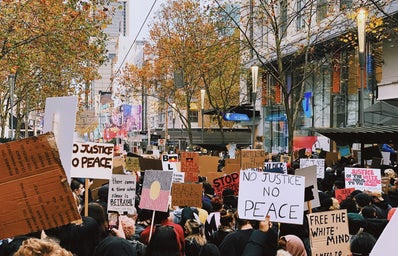Did you scroll your Facebook feed recently? Chances are, you came across a news story or meme shared by a distant acquaintance or family member that just reeks of lies. From “vaccines cause autism” to “#climatehoax”, we are surrounded by all kinds of conflicting information, only some of which is true. Or to use 2016 Oxford Dictionaries Word of the Year, we continue to live in a “post-truth era”, even in 2021.
Whereas misinformation is an honest mistake, disinformation is a known falsehood that is spread deliberately in order to deceive and mislead. Think of misinformation spreaders as your innocent elderly relative who shares Facebook posts that ought to be fact-checked and of disinformation spreaders as trolls and propaganda machines who knowingly spread lies.
To make things less black and white, many people spread false information that they honestly believe is the truth even if several traditionally trustworthy sources have proved otherwise. We’re talking climate change, vaccines, and now COVID-19. There is not always an easy fact-checking machine available, but there is often evidence provided by multiple unbiased and well-executed scientific tests.
Misinformation Loves Company
Who believes in unfounded claims? What do you get out from going against the mainstream? For one thing, misinformation is rarely a solitary business, as both accepted and disputed beliefs are associated with identity and a place of belonging.
In most debates, both sides contain people who believe that they are in the right and that they have the most compelling evidence on the matter. For example, in the climate change debate, most accusations of falsehood are not of the type of “you are wrong” but of “you are lying” (Brüggemann et al., 2020). Calling one’s opponents liars or fraudsters, denialists or alarmists, is comforting because it implies that one’s own group is in the right, both factually and morally. When an opinion becomes part of our personal identity, we can commit ourselves to a cause and achieve a lot. However, if opinion is inseparable from the self, it also becomes exceedingly difficult to change, especially if we are surrounded by people who believe the same things we do.
Collectivism and the sense of belonging is a big reason for joining a belief. But reasons to join a conspiracy in particular include social values such as individualism, competitiveness in favour of cooperation (Adam-Troian et al., 2020). One predictor is lack of faith or mistrust of authorities, including the government and researchers. As conspiracies become more talked about in government, your preferred politician or political party is another predictor. As expected, in U.S., many issues are highly bipartisan and beliefs come as a package-deal. In the case of COVID-19 conspiracies, Republicans overall but especially Trump supporters strongly believe that the threat of the pandemic has been exaggerated (Uscinski et al., 2020). A big demographic rallying around such a risky belief is worrisome because if you believe one conspiracy theory, you are more likely to believe others, too.
Same Information, Different Interpretation
We wish it would be easy to just assign skeptics a bit of reading and wait for them to figure out the truth. However, even when armed with the same bibliography, opposing factions can draw opposing conclusions. Even disinformation spreaders have their secondary sources. As an audience susceptible to disinformation, an important part of our critical reading skill set is noticing how a text considers its topic, how it presents its sources and how it introduces counter-evidence.
To once again take for example the climate change debate, a number of studies have discussed differences in discourses and information sources of climate change activists and sceptics. One study notes that activists and sceptics are very polarized, and people mainly link to sources supporting their beliefs (Elgesem, 2017). As both sides are of course aware of each other, this becomes an example of echo chambers and confirmation bias, where people selectively favour information that supports their beliefs.
Yet even if the same sources are used, there is absolutely nothing to guarantee that they are interpreted in the same way. Depending on whether the sources support the authors’ own view, they may have to be used in different ways. One study compared the rhetorics of how think tanks reported scientific evidence for anthropogenic climate change (Medimorec & Pennycook, 2015). The study found that NIPCC, a think tank denying anthropogenic climate change had to actively refute and reinterpret the scientific findings they cite. In essence, they had to double down in a more forcefully persuasive style. Meanwhile a report by IPCC, a group who does believe in climate change, only has to report what scientists say. Because the scientific findings speak for themselves, the IPCC even get away with critical thinking and cautious discussion, as is common in academic texts. Even if one was not concerned with the truthfulness of the reports, it should be acknowledged that critical thinking and hesitant interpretation are the standard of both scientific writing and responsible reporting.
Finding Common Ground
Deliberate disinformation or identity-defining beliefs about QAnon or the Earth’s shape are tough to uproot. Yet misinformation can usually be discussed and corrected rationally and could be fought with knowledge. People who can define and give causes for climate change are more likely to also believe in climate change (Guy et al., 2014). Likewise, a strong science literacy is essential for understanding COVID-19 infection data and consequently exercising social distancing or other safety measures.
When beliefs link to ideological beliefs such as immigration or action against climate change, it can be useful to change the narrative. For example, in common parlance, climate change is often depicted as a threat to poor societies, wildlife, and sea levels (cf. European Commission, n.d.). This is true, but not the most compelling argument for someone focusing on how climate change and climate change measures can impact their own daily life. In a 2019 interview with Yle, psychology researcher Kirsti M. Jylhä suggested that for right-wing conservative audiences who dismiss the climate change impacts, the urgent threats could instead be contextualised closer to home, through issues of climate refugees or threats to the national romantic biomes. Similar “mind-tricks” had some effect in COVID-19 discussions in 2020, for example in shifting the mask debate from “wear a mask to protect yourself!” (where the response might be “I don’t care if I catch it!”) to “wear a mask to protect others” (which might instead prompt a “well I do care about my loved ones”).
Although constructive discussions between polar opposites are unlikely to happen in the cesspool of heated online discussions, we can take our knowledge of the psychology of beliefs into our more personal encounters. It’s not easy, and there is no miracle cure, but some understanding goes a long way.
References
Adam-Troian, J., Wagner-Egger, P., Motyl, M., Arciszewski, T., Imhoff, R., Zimmer, F., Klein, O., Babinska, M., Bangerter, A., Bilewicz, M., Blanuša, N., Bovan, K., Bužarovska, R., Cichocka, A., Çelebi, E., Delouvée, S., Douglas, K. M., Dyrendal, A., Gjoneska, B., … van Prooijen, J. W. (2020). Investigating the Links Between Cultural Values and Belief in Conspiracy Theories: The Key Roles of Collectivism and Masculinity. Political Psychology. https://doi.org/10.1111/pops.12716
Brüggemann, M., Elgesem, D., Bienzeisler, N., Gertz, H. D., & Walter, S. (2020). Mutual Group Polarization in the Blogosphere: Tracking the Hoax Discourse on Climate Change. International Journal of Communication, 14, 1025–1048.
Elgesem, D. (2017). Polarization in blogging about the paris meeting on climate change. Lecture Notes in Computer Science (Including Subseries Lecture Notes in Artificial Intelligence and Lecture Notes in Bioinformatics), 10539 LNCS, 178–200. https://doi.org/10.1007/978-3-319-67217-5_12
European Commission. (n.d.) Climate change consequences. URL: https://ec.europa.eu/clima/change/consequences_en
Guy, S., Kashima, Y., Walker, I., & O’Neill, S. (2014). Investigating the effects of knowledge and ideology on climate change beliefs. European Journal of Social Psychology, 44(5), 421–429. https://doi.org/10.1002/ejsp.2039
Medimorec, S., & Pennycook, G. (2015). The language of denial: text analysis reveals differences in language use between climate change proponents and skeptics. Climatic Change, 133(4), 597–605. https://doi.org/10.1007/s10584-015-1475-2
Uscinski, J. E., Enders, A. M., Klofstad, C., Seelig, M., Funchion, J., Everett, C., Wuchty, S., Premaratne, K., & Murthi, M. (2020). Why do people believe COVID-19 conspiracy theories? Harvard Kennedy School Misinformation Review, 1(3). https://doi.org/10.37016/mr-2020-015



